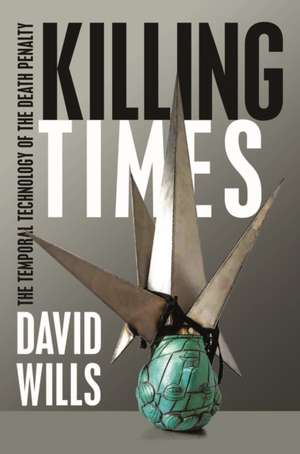Killing Times – The Temporal Technology of the Death Penalty
Autor David Willsen Limba Engleză Paperback – 4 mar 2019
Killing Times traces the logic of the death penalty across a range of sites. Starting with the legal cases whereby American courts have struggled to articulate what methods of execution constitute "cruel and unusual punishment," Wills goes on to show the ways that technologies of death have themselves evolved in conjunction with ideas of cruelty and instantaneity, from the development of the guillotine and the trap door for hanging, through the firing squad and the electric chair, through today's controversies surrounding lethal injection. Responding to the legal system's repeated recourse to storytelling--prosecutors' and politicians' endless recounting of the horrors of crimes--Wills gives a careful eye to the narrative, even fictive spaces that surround crime and punishment. Many of the controversies surrounding capital punishment, Wills argues, revolve around the complex temporality of the death penalty: how its instant works in conjunction with forms of suspension, or extension of time; how its seeming correlation between egregious crime and painless execution is complicated by a number of different discourses. By pinpointing the temporal technology that marks the death penalty, Wills is able to show capital punishment's expansive reach, tracing the ways it has come to govern not only executions within the judicial system, but also the opposed but linked categories of the suicide bombing and drone warfare. In discussing the temporal technology of death, Wills elaborates the workings both of the terrorist who produces a simultaneity of crime and "punishment" that bypasses judicial process, and of the security state, in whose remote-control killings the time-space coordinates of "justice" are compressed and at the same time disappear into the black hole of secrecy. Grounded in a deep ethical and political commitment to death penalty abolition, Wills's engaging and powerfully argued book pushes the question of capital punishment beyond the confines of legal argument to show how the technology of capital punishment defines and appropriates the instant of death and reconfigures the whole of human mortality.
| Toate formatele și edițiile | Preț | Express |
|---|---|---|
| Paperback (1) | 290.51 lei 43-57 zile | |
| ME – Fordham University Press – 4 mar 2019 | 290.51 lei 43-57 zile | |
| Hardback (1) | 675.78 lei 43-57 zile | |
| Wiley – 4 mar 2019 | 675.78 lei 43-57 zile |
Preț: 290.51 lei
Nou
Puncte Express: 436
Preț estimativ în valută:
55.61€ • 60.42$ • 46.74£
55.61€ • 60.42$ • 46.74£
Carte tipărită la comandă
Livrare economică 21 aprilie-05 mai
Preluare comenzi: 021 569.72.76
Specificații
ISBN-13: 9780823283491
ISBN-10: 0823283496
Pagini: 288
Dimensiuni: 186 x 228 x 17 mm
Greutate: 0.4 kg
Editura: ME – Fordham University Press
ISBN-10: 0823283496
Pagini: 288
Dimensiuni: 186 x 228 x 17 mm
Greutate: 0.4 kg
Editura: ME – Fordham University Press
Cuprins
Introduction 1
1. Machinery of Death or Machinic Life 17
2. The Time of the Trap Door 54
3. The Future Anterior of Blood 87
4. Spirit Wind 119
5. Drone Penalty 150
6. Lam Time 185
Appendix: U.S. Supreme Court Cases Cited 217
Acknowledgments 219
Notes 221
Index 253
Notă biografică
David Wills is Professor of French Studies and Comparative Literature at Brown University. His major work, on the originary technicity of the human, is developed in three books: Prosthesis (Stanford, 1995), Dorsality (Minnesota, 2008), and Inanimation (Minnesota, 2016). He has translated various works by Jacques Derrida, including the forthcoming Theory and Practice (Chicago, 2018).
Descriere
Grounded in a deep ethical and political commitment to death penalty abolition, Wills's engaging and powerfully argued book pushes beyond the confines of legal argument to show how the technology of capital punishment defines and appropriates the instant of death and reconfigures the whole of human mortality.
